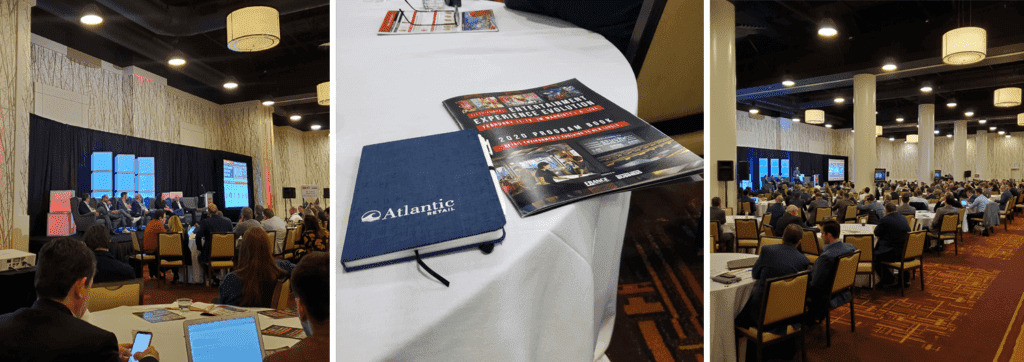In the rapidly evolving retail real estate world, entertainment and experience concepts have emerged as major players absorbing available space left behind by failed legacy retailers. These companies are competing for consumers’ leisure dollars (and time) with various concepts including virtual reality, unique dining, pet-centric venues, and variety entertainment that can not only be experienced but also be shared.
These trends and more were recently discussed at the 6th annual Entertainment Experience Evolution conference in Los Angeles. Brian Roache and Tom Godino, Jr. from our Boston and West Palm Beach offices attended to gain insight into how these concepts are helping redefine and revitalize retail centers. As agents for more than 300 properties nationwide, Atlantic Retail is committed to staying ahead of market trends to better inform our clients. What follows are a few of the takeaways from this conference:
Thinking about an “Entertainment” user for your center? Here are three questions you need to answer first.
Your center recently experienced a large vacancy. It’s still anchored, well-positioned, with good access and parking, but the market just isn’t on the radar for the handful of junior anchors who are still opening new stores. Your broker calls you, and XYZ Super Fun World is interested. The rent is reasonable, they want a bunch of TI, and this is their first location for a rapidly-growing franchise. Their marketing materials make it seem like a mini, indoor Disney World, a guaranteed crowd-pleaser for kids and parents alike. They talk about all the new customers who will be flocking to your center. What do you need to know before you finalize a deal to determine if this tenant has staying power?
- Who is the operator? Unlike in retail, where the shopping experience is peripheral to the main goal of acquiring a product, with these concepts, experience is the goal, and customer experience is a direct reflection of operations. In addition to money, the customer is spending their time. Consider whether the operator has previous experience in running a business that is heavy on customer service. Passive investors aren’t ideal for long term success: operators need to be hands-on and involved in the day to day. They should be passionate about the concept and able to deliver the promised experience. Social media and the “sharing” generation amplifies the effect of customer experience in both directions. Great experiences lead to great Instagram posts and more cars in the parking lot. Bad experiences lead to Yelp reviews and For Lease signs in the windows.
- Is the concept competitive in the market? Just because they are the only trampoline park operator in a 15 minute drive doesn’t mean they are without competition. Leisure time is a finite resource which can be spent numerous ways, often without spending money. Concepts that offer entertainment for the whole family will reach a larger audience and have more staying power than those built for kids who will eventually age out. A high-quality food offering is a must, and the ability to serve alcohol can lead to longer guest stays. Other differentiators, such as regular and unique programming that add variety, will keep them at the top of the list when families are deciding to “go out.” Factors influencing this type of purchase decision are far less about convenience and more about the destination.
- Are they future-proof? One alarming customer preference trend that should keep operators up at night is the “been there, done that” mentality that limits return visits and sends customers to the next venue. Operators need to continually find ways to vary their offering and give customers new experiences in the same venue. If the concept is heavy on fixed equipment or rides, then the operators’ ability to adjust to the market or add the latest technology will be limited by cost or space. Single-experience concepts are far more susceptible to consumer whims compared to those that offer a variety of options. Content-based experiences such as virtual reality have the ability to quickly change their concept to provide customers a new story or game with each visit.
If the last decade of retail deals has taught us anything, it’s that the relationship between landlords and tenants has become more transparent and less adversarial than ever before. Landlords need to view tenants as partners in the health of their shopping centers while tenants need to view landlords as invested (if not financially so) in their success. Large-format entertainment venues are more than just space-fillers: they draw customers in complementary day parts, help expand trade areas, and support neighboring tenants. The tenants themselves need landlords who will give them terms to be flexible with their concept and give the operation enough runway for long-term success.
Demographic trends point to challenges ahead.
Randy White of White-Hutchinson consultants gave the keynote opening presentation, which, if we’re being honest, set the conference off with a somewhat ominous tone. As a consultant to the entertainment industry, W-H studies market trends to help advise their clients on growth strategies. For those of us in the real estate business who are involved in these growth programs, there are two key trends to be aware of.
Demographic Changes: Since the “Great Recession” significant changes in the nation’s demographic make-up have been influencing overall consumer behavior. For example:
- Since 2008, the live birth rate in the US has plummeted more than 12%, reversing a previous growth trend and resulting in 5.8M foregone births
- In 2007, 68% of households had no children under the age of 18. In 2018, that number had risen to 73% and there were 2.3M fewer households with children.
- In 2018, the largest age group was 27 years old (4.8M) and the largest generational group was, not surprisingly, Millennials (age 22-37)
- By 2035, it is projected there will be 5.6M fewer adults age 22-37 (current Gen Z)
- Both men and women are waiting longer to get married and start families. For the first time, in 2018, the largest group of adults aged 25-44 were single w/o children (37%), up 10% since 2001
So in the United States, families are starting later and having fewer kids. This is a trend that owners of real estate should watch carefully as they decide on a tenant mix. Landlords should focus on concepts that appeal to a broad range of age groups in order to protect their centers for the long-term.
Consumer Behavior: White gives us three ways to measure trends for what he calls “Out of Home Entertainment”: time, spending, and participation. Below are a few key facts to consider when evaluating if your trade area can support an entertainment user.
- The population 25+ with a bachelor’s degree or higher has 33% less leisure time than those without a high school degree. However, they spend the highest portion of that leisure time on entertainment and are the only group who actually increased their annual visit rate over the last 5 years.
- Those with bachelor’s degrees are the dominant group across all subcategories, representing 73% of the total spending on Out of Home Entertainment and arts. Additionally, households earning more than $100k annually represent roughly 25% of all households in the US but make up 56% of the spending on all Out of Home Entertainment.
- Across all demographic groups participation is down 11% in the last decade, although the trend has ticked up in the last couple of years. Traditional categories (movies, bowling, billiards) have seen even more dramatic decreases, ranging from 23%-48%
Education and income are the strongest indicators of demand in a trade area as the more affluent and better educated represent the largest share of both participation and spending. Out of Home Entertainment is a zero-sum game for both time and money, and operators find themselves in increasing competition with evolving in-home entertainment options. Just like retailers need to provide customers with an experience they cannot get online, entertainment users need to provide an experience that people cannot get from the comfort of their living room.





